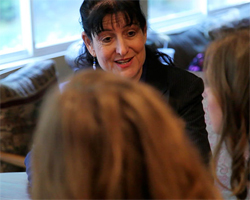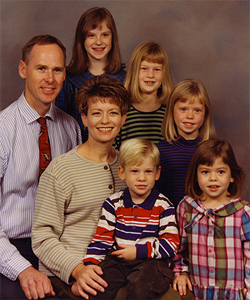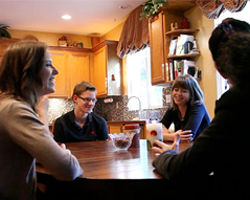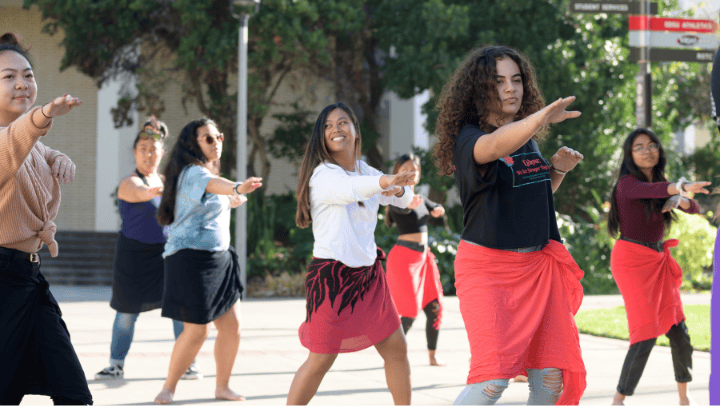Strings Attached
A musical quintet overcame personal tragedy to bring new meaning to the phrase
Cars jammed 55th Street, horns blaring at outlaw drivers flaunting the rules of the road. A news helicopter cut up the sky between four dancing spotlights.
Thousands waited outside Viejas Arena, anxious to get their personal items searched and find their seats for the 91x Wrex the Halls concert, headlined by the once-brilliant indie rock band, The Killers.
A few people pushed past the crowd, walking east to Smith Recital Hall, a decidedly less boisterous but far more elegant venue. There they waited in small groups to hear a quintet of musically-gifted siblings called the Bunnell Strings, who had just completed their first semester at SDSU.
The concert attracted a smattering of devotees and others who would hear the Bunnells’ music for the first time. The walls didn’t shake and the ground didn’t rumble, but the audience was moved nonetheless by the program of original and reinvented music that connected genres in novel ways. At the last note, the crowd rose to its feet for a standing ovation.
“When the audience responds to our music in that way, it’s much easier for us to connect with them, and it makes for a better performance,” said Kimberly Bunnell, 22, who plays cello.
Kimberly works at differentiating herself from her siblings, whether in her choice of instrument, her bold fashion sense or her delectable skills in the kitchen. She’s also the most competitive, a trait she attributes to her determination to outperform older sister Keren, 24.
Broad repertoire
The family played beautifully that December night, showcasing their broad repertoire and talents with a playlist including Mozart, the Beatles, bluegrass music, religious hymns and original compositions dedicated to their parents.
Corrie, who at 21 is the middle sibling, serves as the group’s first violinist. She writes and arranges most of their music, though she’s the first to say it’s a collaborative process that benefits from everyone’s influence.
Cara, 19, also plays violin. Her emotional solos transfix the audience, but in person, she is more apt to make people laugh.

Double-bass player Ross, 17, is the youngest and “the funny one,” according to his sisters. He is simultaneously introspective and curious about the world, a good combination for success in his major, political science.
The Bunnells have performed together for more than a decade. Now, as they perfect their repertoire, SDSU music professor and renowned clarinetist Marian Liebowitz is helping them smooth the rough edges of their business operation, from billing to booking gigs.
She can’t help but marvel at the Bunnells' musical sophistication.
“It’s magical to listen to the arrangements they play and experience their imagination and style,” Liebowitz said. “Corrie’s arrangements have a depth and maturity that you wouldn’t expect from someone her age.”
A mother's influence
Like her siblings, Corrie began playing violin at the age of two. Her mother, Julie, insisted that all the children take lessons. She would sit each of them between her legs and hold their hands in the correct positions.
“She would say, ‘Your wrist needs to be out and your fingers need to go down like castle tops,’” recalled Corrie, wiggling her fingers to demonstrate the technique.
The Bunnells remember those lessons with fondness and poignancy.
“I cried a lot,” Kimberly said. “But mom would tell me, ‘See, you can do two things at once—cry and play the violin.’”
Julie Bunnell shepherded her five children to countless lessons, concerts and community events. She instilled in them a deep love of music, respect for each other and the discipline to fulfill their commitments.
She also homeschooled them through high school, though they did take some community college courses. And more importantly, she kept the family on course when her husband, Jim, a lieutenant commander in the Navy for 27 years, deployed six-months or more at a time during the Persian Gulf War and multiple times after 9/11.
The children would hang paper chains on the walls throughout the family home, removing a link every day until their father returned to San Diego.
Enchanting the audience
When he was home, Jim made his children laugh, teaching them sports and telling rollicking tales about monster mosquitoes that enjoyed eating children.

“He called them, ‘fluzzadillos,’” Corrie explained to the audience as part of an introduction to a song she wrote of the same name.
It opens with pizzicato—a rhythmic plucking that brings their dad’s buzzard-size mosquitoes to life. The song unfolds with fluttering, frolicking notes that render the monsters more enchanting than menacing.
As the concert elapsed that December evening, each sibling shared a memory of their parents—Corrie told of her dad’s fluzzadillos; Cara and Ross talked about family road trips; Kimberly shared that their mom never missed a music lesson; and Keren dedicated their performance of the song “Abide with Me.”
What they did not share were the painful memories. Their dad died of skin cancer in 2007; their mom died of colon cancer in 2010.
Stronger bonds
Jim was sick for three years, beginning when Ross was just 11. After an unsuccessful surgery, the doctors discovered the cancer had spread to his brain, and he was unable to do much of anything for himself.
“The hospice nurses would tell us what was happening and what the process was and how it would further progress, so we were really prepared for it,” Kimberly recalled.
Keren said the experience strengthened bonds in the already tight-knit family.
"We took care of him. We’d make sure he had enough blankets and we’d feed him."
Julie fell ill less than a year after Jim died. She had seen her husband barely survive a debilitating chemo regimen and, after several failed surgeries and a brief attempt at chemo, she decided to forgo further aggressive treatments.
Instead, she did all she could to give her children the best possible chance to succeed and be happy after she was gone. She made certain they would keep their home. More importantly, she ensured they would enjoy living in it together.
“She made us do everything together,” Kimberly said. “If we were in orchestra, we were all in that orchestra. If two of us had a gig, we all went. She wouldn’t accept it any other way.”
Everyone in tune

Keren, Ross and Cara at home in their kitchen.Corrie said their mom taught them how to argue and get over it. “She really drilled that into us. As soon as the argument is over, you move on and you’re laughing the next second.”
Just weeks after their mom died, Keren, 21 at the time, petitioned Family Court for guardianship of Cara and Ross, who were then 17 and 15.
She became the lynchpin that held the family together – a role she had prepared for under her mother’s guidance in the twilight of Keren’s adolescence. It’s a role that translates to the stage as well.
“I like responsibility and I like taking care of people,” Keren said. “When we play, I’m just making sure that we’re staying together. Nobody’s rushing, nobody’s going too slowly. Everyone is in tune.”
Thus far, the plan has worked. The five siblings live happily together, sharing responsibility for laundry, shopping, cooking and paying bills, though sometimes the dirty dishes get overlooked.
To be a friend of one sibling is to be a friend of all. Keren and Kimberly have longtime boyfriends, who double as handymen around the house.
Oozing with talent
The family wakes at the break of dawn and drives together to SDSU, instruments packed in the back of their 2008 Toyota Camry. They stay until 5 p.m. for Ross to finish his last class. In between, they study, eat and practice.
“We’ve never left a sibling behind, but we can’t say the same about our instruments,” Cara laughed.
And, of course, they make music together, committed to the dream they shared with their mother. They plan to continue for the next three years; then decide whether to go on performing as a family.
At that point they will have seen what it is like to tour nationally, be a full-time quintet and record an album, said Liebowitz, their mentor.
“They ooze with talent and I hope they make it over the long haul,” she added. “The Bunnells have struggled to a certain extent with, ‘do we want to do this or are we just doing this to please our mom.’ But they are at a place in their lives right now where they are interested in doing it for themselves.”
At the same time, even if they never play in front of thousands of fans in a venue like Viejas Arena, the family knows they honor their parents with every performance.
“I remember mom said that the trials in our lives would one day help us influence other people,” reflected Kimberly. “And that the things we experience would only make us stronger.”
Julie Mashburn contributed to this story.



